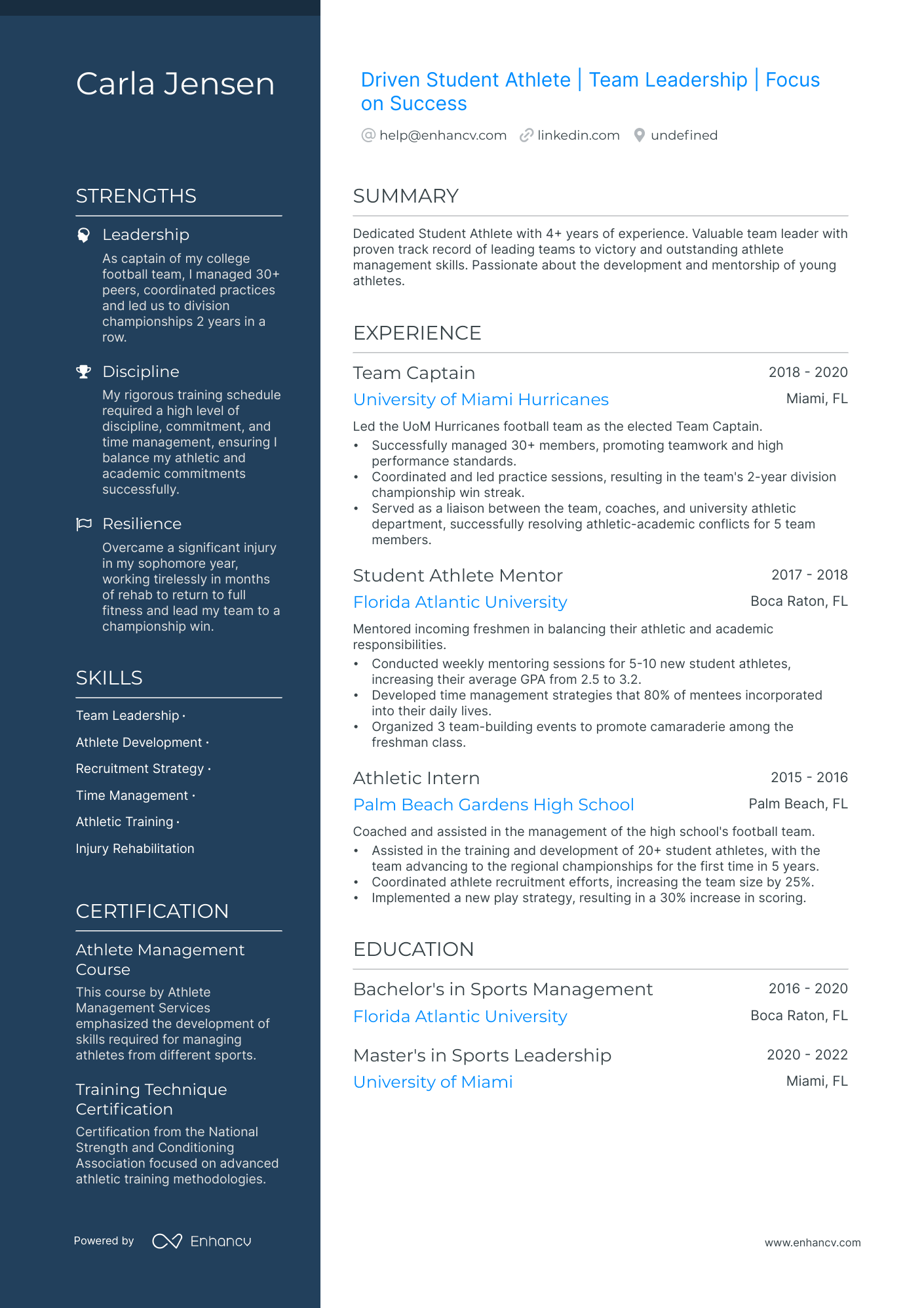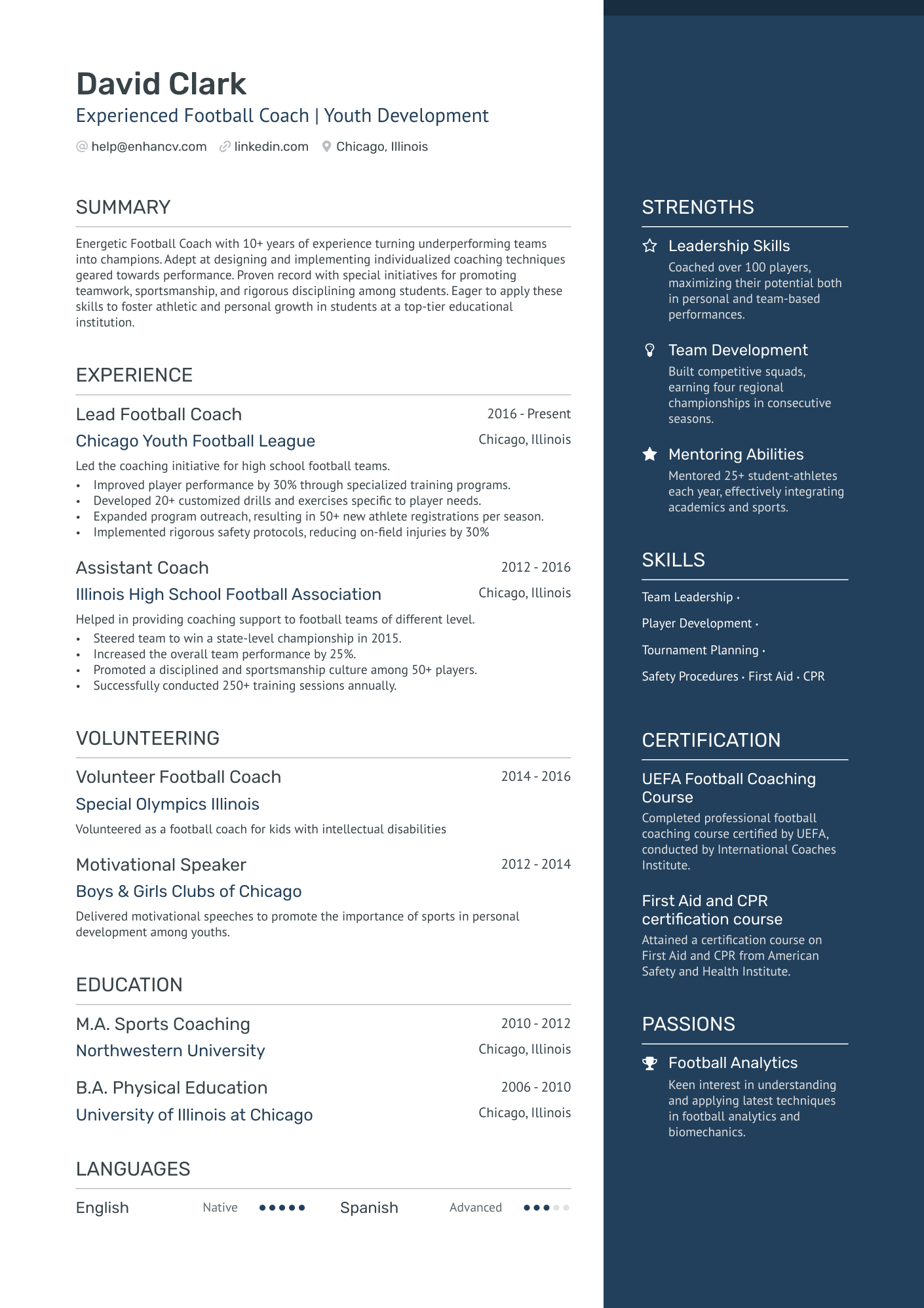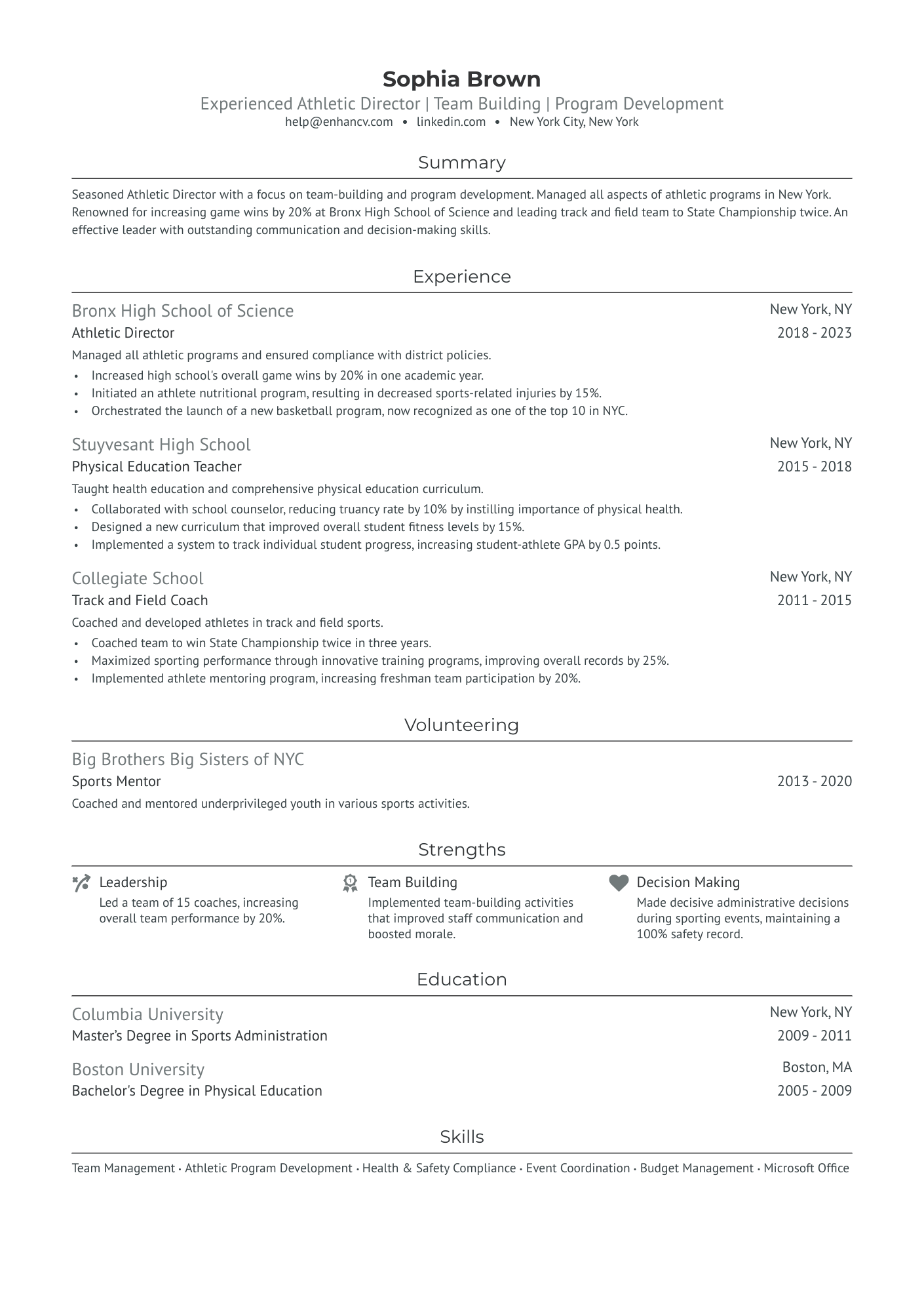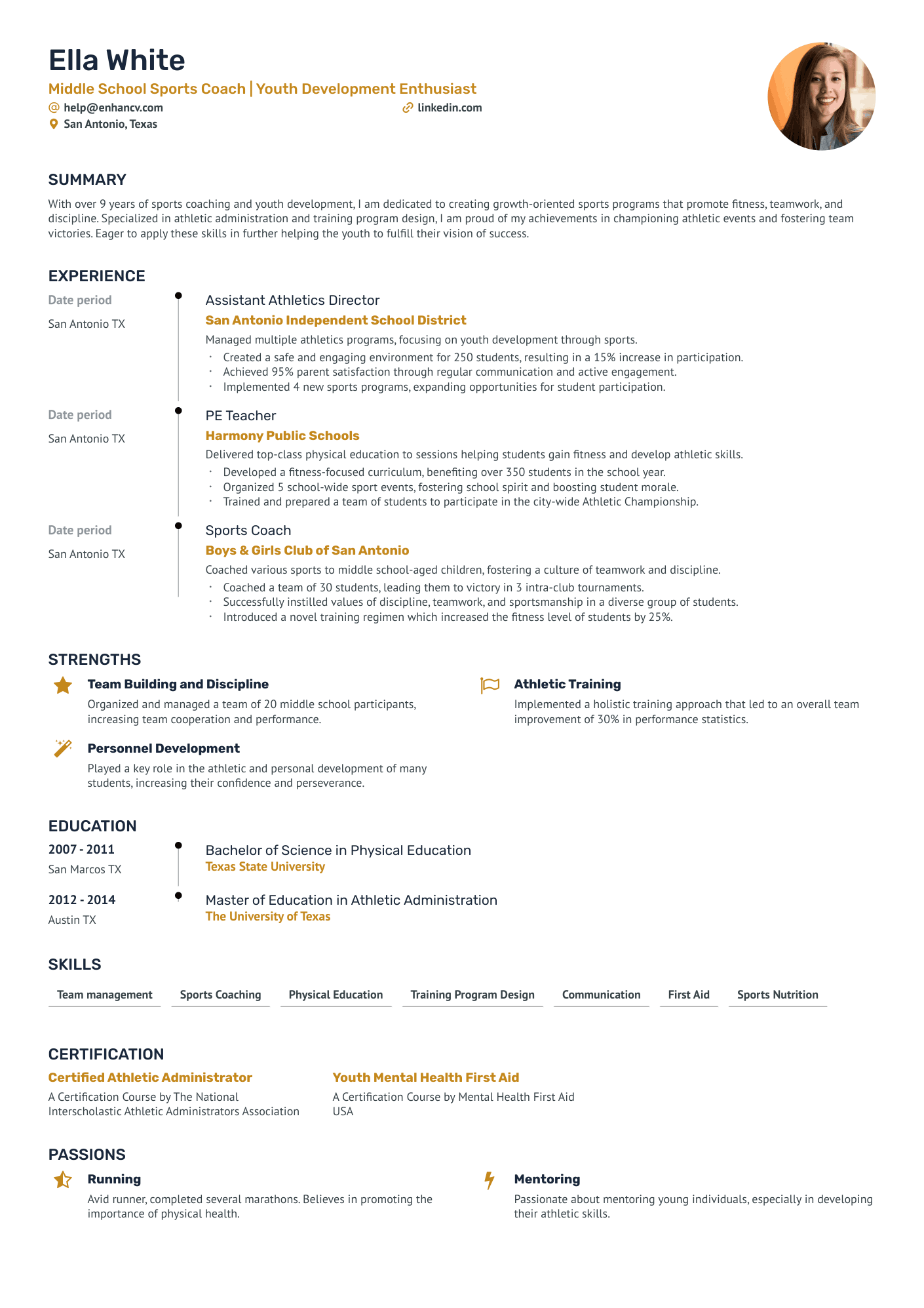As an athlete transitioning into a new career, you might struggle to convey the relevance of your sports experience on a professional resume. Our comprehensive guide is designed to help you effectively translate your athletic discipline, teamwork, and dedication into compelling skills and accomplishments that resonate with employers.
- Aligning the top one-third of your athlete resume with the role you're applying for.
- Curating your specific athlete experience to get the attention of recruiters.
- How to list your relevant education to impress hiring managers recruiting for the athlete role.
Discover more athlete professional examples to help you write a job-winning resume.
- Fitness Manager Resume Example
- Camp Counselor Resume Example
- Yoga Teacher Resume Example
- Tour Director Resume Example
- Personal Trainer Resume Example
- Fitness Director Resume Example
- Community Organizer Resume Example
- Tour Manager Resume Example
- Resort Manager Resume Example
- Event Director Resume Example
The ultimate formula for your athlete resume format
Our best advice on how to style your athlete resume is this - first, take the time to study the job advert requirements.
The resume format you select should ultimately help you better align how your experience matches the specific role.
There are four crucial elements you need to thus take into consideration:
- How you present your experience. If you happen to have plenty of relevant expertise, select the reverse-chronological resume format to organize your experience by dates, starting with the latest.
- Don't go over the top with writing your resume. Instead, stick with a maximum of two-page format to feature what matters most about your profile.
- Headers aren't just for "decoration". The header of your resume helps recruiters allocate your contact details, portfolio, and so much more.
- The PDF format rules. It's the most common practice to submit your athlete resume as a PDF so that your resume doesn't lose its layout. However, make sure the read the job well - in some instances, they might require a doc file.
Upload & Check Your Resume
Drop your resume here or choose a file. PDF & DOCX only. Max 2MB file size.
PRO TIP
The more trusted the organization you've attained your certificate (or degree) from, the more credible your skill set would be.
The six in-demand sections for your athlete resume:
- Top one-third should be filled with a header, listing your contact details, and with a summary or objective, briefly highlighting your professional accolades
- Experience section, detailing how particular jobs have helped your professional growth
- Notable achievements that tie in your hard or soft skills with tangible outcomes
- Popular industry certificates to further highlight your technical knowledge or people capabilities
- Education to showcase your academic background in the field
What recruiters want to see on your resume:
- Record of Athletic Achievements: Detailed information on medals, titles, records, or championships won.
- Physical and Fitness Attributes: Specific statistics such as speed, strength, endurance, agility, and relevant physical skills.
- Teamwork and Leadership: Examples of being a team player or a leader, including captainship or mentoring roles within a team context.
- Training and Discipline: Evidence of commitment to training, practice routines, discipline in off-season training, and any notable improvements.
- Coachability and Teachability: Willingness to learn from coaches, adaptability to different strategies or plays, and a positive attitude towards feedback.
Creating your athlete resume experience to catch recruiters' attention
Remember that for the athlete role, hiring managers are looking to see how your expertise aligns with their requirements. Here's where your resume experience section can help out. Make sure you:
- Include mainly roles that are relevant to the athlete job you're applying for;
- Don't go too far back in your experience - recruiters will only care what you did a decade ago if it's really important for the athlete role;
- Each bullet you include should say what you did, followed by the skills you used and the actual end result of your efforts;
- Quantify each of your achievements with numbers and possibly the overall effect it had on the organization;
- Highlight transferrable skills - or personal skills you've attained thanks to past jobs - that could be applicable within your potential workplace. This would showcase your unique value as a professional.
Formatting the experience section of your resume doesn't have to be an over-the-top deep dive into your whole career. Follow the athlete resume examples below to see how industry-leading professionals are presenting their experience:
- Developed and executed a rigorous training program that improved my 100m dash time by 15%, showcasing dedication and self-discipline in achieving personal goals.
- Collaborated with an international team of coaches and sports scientists to enhance my technical skills, which led to my qualification for the Olympic Games.
- Actively engaged in brand endorsement deals and public speaking, which contributed to an increase in the sponsoring brand's visibility by 25%.
- Lead the team as the captain, setting strategic plays that contributed to winning the National Championship, solidifying leadership skills and tactical understanding.
- Maintained peak physical condition through a tailored nutritional program and advanced strength training, resulting in optimal performance during critical competitions.
- Engaged with community outreach programs, mentoring young athletes and promoting sportsmanship, which enlarged the fanbase and fostered a cohesive community relationship.
- Employed advanced analytics and video review to gain a strategic edge over competitors, leading to a 20% increase in match wins over two seasons.
- Actively participated in sponsorship negotiations, securing deals that provided vital financial support for travel, gear, and training expenses.
- Established a youth volleyball clinic responsible for coaching over 150 students annually, demonstrating leadership and fostering the growth of the sport.
- Mastered cutting-edge stroke techniques and hydrodynamic efficiency improvements under the guidance of elite coaches, leading to a top 5 world ranking in the 200m butterfly.
- Pioneered the adoption of virtual reality training programs within my practice routine, enhancing cognitive skills and situational awareness during races.
- Cultivated a solid personal brand through social media engagement, tripling my follower count, and amplifying sponsor exposure and community impact.
- Spearheaded a cross-disciplinary partnership with a technology firm to develop a data-driven performance analysis platform, optimizing my preparation and recovery strategies.
- Secured a podium finish in four consecutive international triathlon events through strategic pacing and exceptional endurance conditioning.
- Organized charitable fundraising events through competition participations, raising over $200,000 for health and wellness non-profits.
- Directed a junior athlete mentorship program, enhancing the skill set of over 200 young individuals and guiding them towards potential scholarships and professional opportunities.
- Integrated sports psychology techniques into my training routine, significantly decreasing recovery time from injuries and improving mental resilience during competition.
- Represented my country in international tennis tournaments, ranking within the top 50 globally, and elevating my nation's presence in the sport.
- Redefined personal conditioning methods by adopting a hybrid training system, which allowed me to reach the peak kinesthetic performance for mixed martial arts engagements.
- Became a title-holder in the featherweight division after an undefeated streak across 12 bouts, underlining perseverance and skill enhancement.
- Promoted fitness and self-defense by establishing a local MMA academy, successfully enrolling over 100 students in the first year and enhancing the sport's popularity regionally.
- Executed a rigorous biomechanics-driven training approach that saw a 30% increase in my alpine skiing speeds, setting new personal and competitive benchmarks.
- Collaborated with equipment manufacturers to design and test high-performance skiing gear, which is now being adopted by competitors internationally for its efficiency gains.
- Championed environmental awareness by aligning with eco-friendly sponsorship programs, influencing positive brand alignment and environmental conservation efforts.
The following content includes information from "O*NET OnLine" by the U.S. Department of Labor, Employment and Training Administration (USDOL/ETA). Used under the CC BY 4.0 license. The data represents the top responsibilities present on the task lists for athlete professionals.
Top Responsibilities for Athlete:
- Assess performance following athletic competition, identifying strengths and weaknesses and making adjustments to improve future performance.
- Attend scheduled practice or training sessions.
- Maintain optimum physical fitness levels by training regularly, following nutrition plans, or consulting with health professionals.
- Participate in athletic events or competitive sports, according to established rules and regulations.
- Exercise or practice under the direction of athletic trainers or professional coaches to develop skills, improve physical condition, or prepare for competitions.
- Receive instructions from coaches or other sports staff prior to events and discuss performance afterwards.
- Represent teams or professional sports clubs, performing such activities as meeting with members of the media, making speeches, or participating in charity events.
- Lead teams by serving as captain.
Quantifying impact on your resume
- List the number of competitive events participated in to demonstrate consistency and experience in high-pressure situations.
- Include specific personal records or best times to show a trajectory of improvement and peak performance levels.
- Quantify the amount of team practice hours per week to highlight dedication and work ethic.
- Detail the percentage improvement in performance statistics over a period to showcase growth and adaptability.
- Mention the ranking within a team, league, or competition to provide context to your competitive standing.
- Note the number of awards or accolades received to emphasize recognition in your field.
- Specify the number of off-season training hours to show commitment to maintaining and improving skill levels year-round.
- State the percentage of financial sponsorships or scholarships earned through athletic performance to indicate the financial impact of your sports career.
Action verbs for your athlete resume
Remember these four tips when writing your athlete resume with no experience
You've done the work - auditing the job requirements for keywords and have a pretty good idea of the skill set the ideal candidate must possess.
Yet, your professional experience amounts to a summer internship .
Even if you have limited or no professional expertise that matches the role you're applying for, you can use the resume experience section to:
- List extracurricular activities that are relevant to the job requirements. Let's say you were editor-in-chief of your college newspaper or part of the engineering society. Both activities have taught you invaluable, transferrable skills (e.g. communication or leadership) that can be crucial for the job;
- Substitute jobs with volunteer experience. Participating in charity projects has probably helped you develop an array of soft skills (e.g. meeting deadlines and interpersonal communications). On the other hand, volunteering shows potential employers more about you: who you are and what are the causes you care about;
- Align job applications with your projects. Even your final-year thesis work could be seen as relevant experience, if it's in the same industry as the job you're applying for. Ensure you've listed the key skills your project has taught you, alongside tangible outcomes or your project success;
- Shift the focus to your transferrable skills. We've said it before, but recruiters will assess your profile upon both job requirements and the skills you possess. Consider what your current experience - both academic and life - has taught you and how you've been able to develop your talents.
Recommended reads:
PRO TIP
Bold the names of educational institutions and certifying bodies for emphasis.
Athlete resume skills: the essential hard skills and soft skills checklist
Ultimately, your athlete resume should hint to recruiters that you possess an array of talents that are indispensable to the role.
For example, listing the technologies and software you're apt at using (or your hard skills) and how you apply them in your day-to-day responsibilities would ensure you meet the technical requirements of the role.
But is this enough to ensure that you make a good impression on recruiters?
Go a step further by detailing the soft skills or personality traits you've attained thanks to your work and life experience.
The best way to balance hard skills and soft skills on your athlete resume is by:
- Highlighting up to three of your most noteworthy career accomplishments in a separate section.
- Listing at least one hard skill and one soft skill you've used to solve a particular challenge or problem.
- Feature niche skills and technologies that would help you stand out amongst candidates.
- Think back on the social impact your efforts have had towards improving the work environment - were you able to always maintain a professional ethic, while enhancing the team culture? Write about your contribution to the role, department, or organization itself as a metric of success.
The skills section of your resume provides you with plenty of opportunities to detail your technical and personal traits.
All you have to do is select the talents that best fit your application and expertise. Make note of some of the most prominent hard and soft skills across the industry from our list:
Top skills for your athlete resume:
Strength Training Techniques
Endurance Training Equipment
Biomechanics Analysis Tools
Nutrition Tracking Software
Performance Monitoring Devices
Video Analysis Software
Sports Medicine Equipment
Recovery Technologies
Wearable Fitness Trackers
Sports Analytics Platforms
Teamwork
Discipline
Time Management
Goal Setting
Resilience
Communication
Adaptability
Focus
Leadership
Motivation
Next, you will find information on the top technologies for athlete professonals from "O*NET OnLine" by the U.S. Department of Labor, Employment and Training Administration (USDOL/ETA). Used under the CC BY 4.0 license.
Top technologies for Athlete’s resume:
- Microsoft Excel
- YouTube
- Email software
PRO TIP
Listing your relevant degrees or certificates on your athlete resume is a win-win situation. Not only does it hint at your technical capabilities in the industry, but an array of soft skills, like perseverance, adaptability, and motivation.
Certifications and education: in-demand sections for your athlete resume
Your academic background in the form of certifications on your resume and your higher degree education is important to your application.
The certifications and education sections pinpoint a variety of hard and soft skills you possess, as well as your dedication to the industry.
Add relevant certificates to your athlete resume by:
- Add special achievements or recognitions you've received during your education or certification, only if they're really noteworthy and/or applicable to the role
- Be concise - don't list every and any certificate you've obtained through your career, but instead, select the ones that would be most impressive to the role
- Include the name of the certificate or degree, institution, graduation dates, and certificate license numbers (if possible)
- Organize your education in reverse chronological format, starting with the latest degree you have that's most applicable for the role
Think of the education and certification sections as the further credibility your athlete resume needs to pinpoint your success.
Now, if you're stuck on these resume sections, we've curated a list of the most popular technical certificates across the industry.
Have a look, below:
The top 5 certifications for your athlete resume:
- Certified Strength and Conditioning Specialist (CSCS) - National Strength and Conditioning Association (NSCA)
- Certified Sports Nutritionist (CISSN) - International Society of Sports Nutrition (ISSN)
- Performance Enhancement Specialist (PES) - National Academy of Sports Medicine (NASM)
- Corrective Exercise Specialist (CES) - National Academy of Sports Medicine (NASM)
- Advanced Sports Performance Coach Certification - USA Weightlifting (USAW)
The content below includes information from "O*NET OnLine" by the U.S. Department of Labor, Employment and Training Administration (USDOL/ETA). Used under the CC BY 4.0 license. The data represents the top associations for athlete professionals.
Top US associations for a Athlete professional
- International Horsemanship Association
- National Council of Youth Sports
- National Federation of State High School Associations
PRO TIP
Mention specific courses or projects that are pertinent to the job you're applying for.
Recommended reads:
Which one to use: a resume summary or a resume objective?
The athlete resume summary or objective serves as a good introduction to your experience for recruiters.
Have you ever wondered which one (the summary or objective) will be more appropriate for your athlete resume?
- If you are a less experienced professional, write a resume objective statement. The objective is about three sentences long and provides recruiters with information about your career goals, strengths, and achievements . It should basically denote how you see yourself in this particular role, and what is your relevant experience and/or know-how;
- If you happen to have plenty of relevant experience, select your most impressive achievements for your resume summary. The summary is no longer than five sentences and serves as a storytelling instrument - highlighting your greatest career wins . Don't forget to align your summary with the job requirements to ensure your resume stays relevant to the role.
Read on for more information and examples of resume summaries and objectives from real world professionals.
Resume summaries for a athlete job
- Seasoned professional basketball player with over a decade of international experience, boasting a record-setting 73% free throw success rate last season. Adept at teamwork, offensive strategies, and maintaining peak physical condition through rigorous training and nutrition programs.
- Decorated swimmer with 5 years of competitive experience, consistently ranking in the top 10 at national championships. Specializes in freestyle and butterfly strokes, having achieved the fastest 100-meter butterfly time in state history, and recognized for unparalleled work ethic and discipline.
- Former IT project manager seeking to leverage 8 years of team leadership and analytical skills into a high-performance athletic environment. Has completed a certified personal training program and is eager to apply strategic planning abilities towards achieving excellence in sports coaching.
- Dynamic marketing expert and marathon enthusiast transitioning to professional running, bringing a strong background in brand promotion and endurance training. Combining passion for long-distance running with over 7 years of experience in strategic advertising campaigns, ready to achieve new records on the track.
- Eager to embark on a professional athletic journey utilizing my recent degree in Sports Science and vigorous training regimen. Aspires to contribute youthful energy and contemporary fitness techniques to excel in competitive sports, with a dedication to evolving and reaching elite athletic performance.
- Aspiring athlete with no formal experience but a lifelong commitment to fitness and health. Actively seeking to apply a background in nutritional studies and a personal history of athletic pursuits in team sports, eager to cultivate professional skills and make meaningful contributions to a sports team’s success.
Average salary info by state in the US for Athlete professionals
Local salary info for Athlete.” Source: My Next Move, National Center for O*NET Development. Accessed 10/15/2024
| State | Average Salary (in USD) |
|---|---|
| US National Average | $70,280 |
| Texas (TX) | $193,000 |
| New York (NY) | $82,540 |
| Pennsylvania (PA) | $67,380 |
Other athlete resume sections to support your expertise and skills
Recruiters are always on the lookout for that athlete candidate who brings about even more value to the role.
This can be either via their personality or additional accreditations they have across the industry.
Add to your resume any of the four sections that fit your profile:
- Projects for your most impressive, cutting-edge work;
- Awards or recognitions that matter the most;
- Publications further building up your professional portfolio and accreditations;
- Hobbies and interests to feature the literature you read, how you spend your time outside of work, and other personality traits you deem may help you stand out .
Key takeaways
At the end of our guide, we'd like to remind you to:
- Invest in a simple, modern resume design that is ATS friendly and keeps your experience organized and legible;
- Avoid just listing your responsibilities in your experience section, but rather focus on quantifiable achievements;
- Always select resume sections that are relevant to the role and can answer job requirements. Sometimes your volunteering experience could bring more value than irrelevant work experience;
- Balance your technical background with your personality traits across various sections of your resume to hint at how much time employers would have to invest in training you and if your profile would be a good cultural fit to the organization;
- Include your academic background (in the form of your relevant higher education degrees and certifications) to show recruiters that you have the technical basics of the industry covered.
Athlete resume examples
Explore additional athlete resume samples and guides and see what works for your level of experience or role.
By Experience
Student Athlete
By Role









